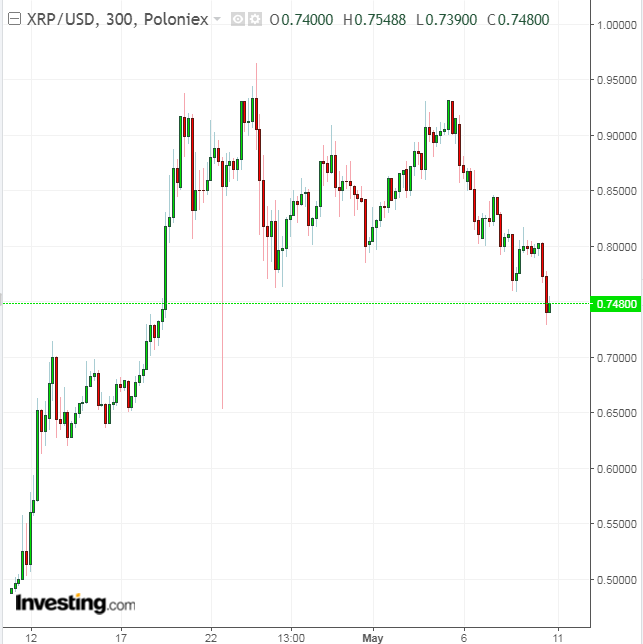The third largest cryptocurrency by market cap, Ripple (XRP) has been hit with a class action lawsuit, filed last Thursday, 3 May in the US. The token's price has tumbled over the past week, down 13.45% over the past seven days, -6.01% over the past 24 hours.

The lawsuit’s plaintiff, Ryan Coffey, is seeking unspecified damages and a declaration that Ripple Labs has been selling unregistered securities. The full complaint can be found here. The document highlights that the US Securities and Exchange Commission (SEC) has made it clear that digital tokens such as XRP, often constitute “securities and may not be lawfully sold without registration with the SEC or pursuant to an exemption from registration."
Coffey's suit is directed at both the company and its CEO Brad Garlinghouse and alleges that rather than being mined, like Bitcoin or Ethereum for instance, XRP tokens "were created out of thin air" and held by Ripple-connected individuals releasing the alt-coin selectively, in a never-ending ICO. The suit claims that insiders were quietly selling Ripple to the public in an effort drive up demand and pricing for the token, in order to profit accordingly.
Yesterday reports surfaced that California-based Johnson Fistel, LLP, a law firm specializing in shareholder rights, is also “investigating potential claims against Ripple Labs.”
It hasn't been all bad news for XRP though. On Tuesday Ripple announced that South Korean cryptocurrency exchange Coinone is turning to Ripple's enterprise blockchain network for cross-border payments.
Security...Or Something Else?
With Ripple in the spotlight in this way, it flags, yet again, the need for regulatory clarity alongside the key question that still has to be addressed, both for Ripple and other similar alt-currencies—is XRP a security?
Recent Bloomberg reporting points out that because XRP isn't clearly defined, it could mean it's considered a security according to SEC guidelines. Should that be the case, XRP would no longer be classified as a cryptocurrency. If that happens it would become subject to the rules and requirements similar to those that govern assets like stocks.
Never before have we needed clearer regulation around cryptocurrencies says Antoine Verdon, CEO and Cofounder of Proxeus, pointing to this developing situation. The ambiguity surrounding XRP serves as a very good example for why ICOs need to take a longer view towards compliance and regulation, he notes.
“How crypto will be regulated is up for discussion, it is coming, and fast. So it’s in everyone’s best interest that the cryptocurrency community helps guide itself through self-regulation and ethical conduct from the beginning.”
Ridiculous Charges?
Nick Saponaro, co-founder and Lead Full Stack Developer at The Divi Project, believes the charges against Ripple are almost comical to anyone with an understanding of their technology and the nature of the XRP token.
“The listed allegations are not news to anyone who has been involved in the cryptocurrency market long enough to have a fundamental understanding of it. And if someone doesn’t have a fundamental understanding of a market, why blindly throw your money into it?”
Saponaro highlights that the technical specs around Ripple are evident in Ripple’s own descriptions of its technology: that it maintains a centralized XRP ledger and that XRP’s success requires “the Efforts of Ripple Labs and Others.” In his view, the class action suit is reflective of Ryan Coffey and other disgruntled investors not having done adequate research before making an investment decision.
“Ripple didn’t deceive anyone. These people probably saw Ripple’s XRP token rising on the news and thought, 'hey let me try my hand at this get-rich-quick crypto thing my kids are telling me about.' They failed, panic sold, and got mad because they made a poor investment in something they didn't understand.”
Educated Gamble, Not a Get Rich Quick Scheme
There’s some harsh truth to what Saponaro is saying, not to mention a few lessons to be learned. Too many investors entered into cryptocurrencies under the mistaken assumption the tokens were a quick route to riches without fully understanding the technology.
In more than a few cases they were wiped out. Ryan Coffey, who initiated the lawsuit, did in fact get burned trading XRP—he lost a total of $551. Saponaro says:
“What I hope this lawsuit will show is that cryptocurrency is not a get rich quick scheme. It is an educated gamble at best and if you don't know what you're doing you can lose your money very quickly. Unfortunately, what the allegations will likely do instead is create a bunch of FUD that naysayers [who] will use this to keep otherwise interested investors from making the leap into a next generation technology (after doing their research).”
